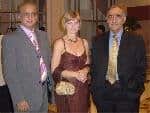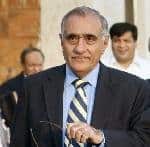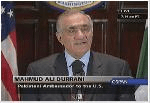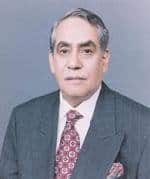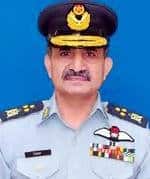National Security Advisor to the PM
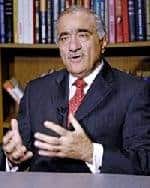
Mahmud Ali Durrani born 1941 is a retired Pakistani army officer. He was the National Security Advisor to Prime Minister Yousaf Raza Gillani’s administration until he was fired in January 2009 for “not consulting the Prime Minister while giving statements on foreign relation matters”. The matter in question was the acceptance by the Government of Pakistan of the Pakistani nationality of the sole surviving terrorist Ajmal Kasab, who was involved in the 2008 Mumbai attacks and was in the custody of the Mumbai police.
Durrani had previously served as Pakistan Ambassador to the United States. He was replaced as ambassador by Husain Haqqani in May 2008.
Early years and military career
Durrani was born in 1941 in Abbottabad, which is in the Khyber Pakhtunkhwa province of Pakistan. He is an ethnic Pashtun from the Durrani tribe. After graduating from Pakistan Military Academy in 1961 in the 24th PMA Long Course (same batch as General Jehangir Karamat who later became the Army chief) and winning the sword of honour, he served in various command, staff and instructional posts for about 16 years. From 1977 to 1982 he was Pakistani Armed Forces attaché in Washington, D.C. He then served as military secretary to the president of Pakistan until 1986.
Durrani has been published as a leader persuaded the Division 1 armored in Multan, and being MS’s former army chief and the then President General Mohammad Zia ul-Haq to witness the tank exercise in Bahawalpur desert on August 17, 1988. Was on its way back to Islamabad, the C-130 carrying the presidential entourage and the Supreme Military crashed right after takeoff from Bahawalpur airport, killing all its passengers.
He was also suspected by the then U.S. ambassador to India, John Gunther Dean for being unusually insistent with President Zia ul-Haq in a visit to the demonstration. From many circles in Pakistan and is considered to be the prime suspect in the incident .. Can prevail in Durrani, General Zia ul-Haq because he was the military secretary, the most trusted. In fact, after the death of General Zia ul-Haq, and continued to Begum Khaleda Zia to rest in the confidence of Gen. Durrani, as stated in the shades of Khaki by Mahmoud Khaled Aref, General and Chief of Staff under Zia, published in 2001.
From 1992 to 1998 and was Chairman of the Durrani Pakistan Ordnance Factories. Mahmud Ali Durrani, a retired Major General of the Pakistan Army.
Academic and diplomatic career
Durrani was also an advisor in the International Institute for Strategic Studies in London, which he served from 2001 to 2004. After retiring from the Pakistani Army, he was actively involved in the peace efforts between Pakistan and India. As part of a process sponsored by the United Nations, he also worked with former senior officials from the United States, Russia and Iran to find a peaceful resolution to the Afghan crisis.
Durrani was appointed as Pakistan Ambassador to the United States by President Pervez Musharraf in June 2006, replacing another General Jehangir Karamat. They both belong to the Armoured corps of Pakistan Army, with Durrani being the third Armoured Corps officer to take the helms of ambassadorship at Washington, D.C.; the first one was Lt Gen Ejaz Azim, who was ambassador during General Zia-ul-Haq and Reagan era.
Durrani was also called “General Shanti” by an Indian newspaper for his effort in trying to promote peace with India and Pakistan.
National Security Adviser
Durrani was appointed National Security Adviser to Prime Minister Yousaf Raza Gillani in April 2008 at the behest of Asif Ali Zardari who at the time only held the post of co-chairman Pakistan Peoples Party (he became the President in September 2008). This was partly the reason why Durrani was fired from his job as NSA by Gillani for not “taking Prime Minister into confidence” about Kasab’s nationality, even though Durrani had consulted the ISI chief who had in turn consulted the President Zardari before announcing that Ajmal Kasab was a Pakistani national.
Books
Durrani is the author of several books and studies, including India and Pakistan: The Cost of Conflict and the Benefits of Peace and Pakistan’s Security Imperatives: Year 2000 and Beyond. The first one he wrote when he was part of United States-sponsored Balusa Group formed under Ambassador Shirin R. Tahir-Kheli at the Paul H. Nitze School of Advanced International Studies in Washington, D.C.
The book argued that in the process of Indo-Pakistan normalisation, based on the Balusa Group’s recommendations, Pakistan should take the initiative in “re-engaging” India after the 1999 Kargil operation and subsequent negative events associated with Pakistan policies. Strikingly, the stages of engagement outlined in the book were followed closely by President Pervez Musharraf after 2001: “Preliminary Secret Contacts, Stage Two Secret Meetings, Summit, Follow-up Meetings.”
He is the father of three children.
Mahmud Ali Durrani Pictures
|
|
|
| ||||||||
|
|
|

